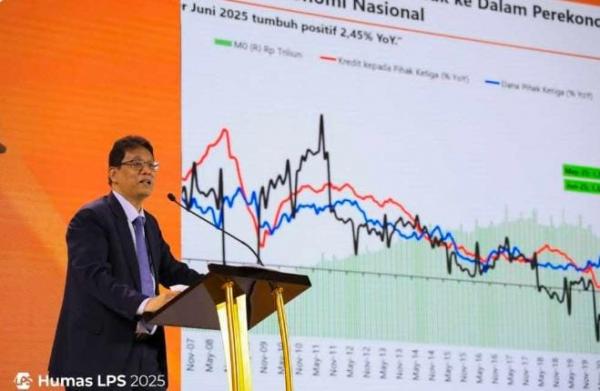Amid concerns over the global economic slowdown, Indonesia has demonstrated commendable financial resilience. The Chairman of the Board of Commissioners of the Deposit Insurance Corporation (LPS), Purbaya Yudhi Sadewa, emphasized that the system remains solid and capable of withstanding external shocks.
“If we look closely, our banking and financial sectors continue to transform. That’s where their strength lies,” he stated during an official event in Surabaya.
He added that public trust must be continuously maintained to support the stability of the national financial system. Despite external pressures, Indonesia’s banking industry has shown strong performance. The Capital Adequacy Ratio (CAR) as of June 2025 stood at 25.81%, up from 25.48% the previous month—an indicator of the banking sector’s robust capital structure.
Additionally, annual credit growth (YoY) reached 7.77%, accompanied by Third-Party Fund (DPK) growth of 6.96%. Meanwhile, the gross non-performing loan (NPL) ratio remained stable at 2.22%.
The deposit sector also showed positive trends. LPS reported that deposits with balances below Rp2 trillion increased by Rp143.22 trillion (4.29% YoY), while deposits above Rp2 trillion surged by Rp459.49 trillion (8.46% YoY). This data indicates strong trust in banking stability, both from individuals and corporations.
“Increased liquidity flowing into the economic system will have a cascading effect on national growth,” Purbaya emphasized.
Furthermore, Purbaya highlighted that Indonesia’s economic strength stems from robust domestic demand. This is reflected in the contribution of consumption to national GDP in Q2 2025, which reached 62.53%—including household consumption, non-profit institutions, and government spending.
Interestingly, investment (PMTB) also showed positive growth of 6.99% YoY, sufficient to balance the pressure from declining government expenditure.
“As long as domestic demand remains strong, we have a sufficient buffer against external pressures,” he said.
Beyond consumption, Indonesia’s demographic advantage stands as a strategic strength. Over 60% of the population is currently of productive age (15–64 years), dominated by Millennials, Gen Z, and Gen Alpha.
“This is not just potential but a strategic asset. The younger generation will be the backbone of the national economy and future leaders,” Purbaya remarked optimistically.
Concluding his statement, Purbaya acknowledged that global risks are unavoidable, but Indonesia possesses strong fundamentals: a resilient domestic economy and a large productive population.
“There’s no need to panic. The key is to stay vigilant, continue strengthening the domestic economic structure, and leverage the demographic dividend effectively,” he concluded.




